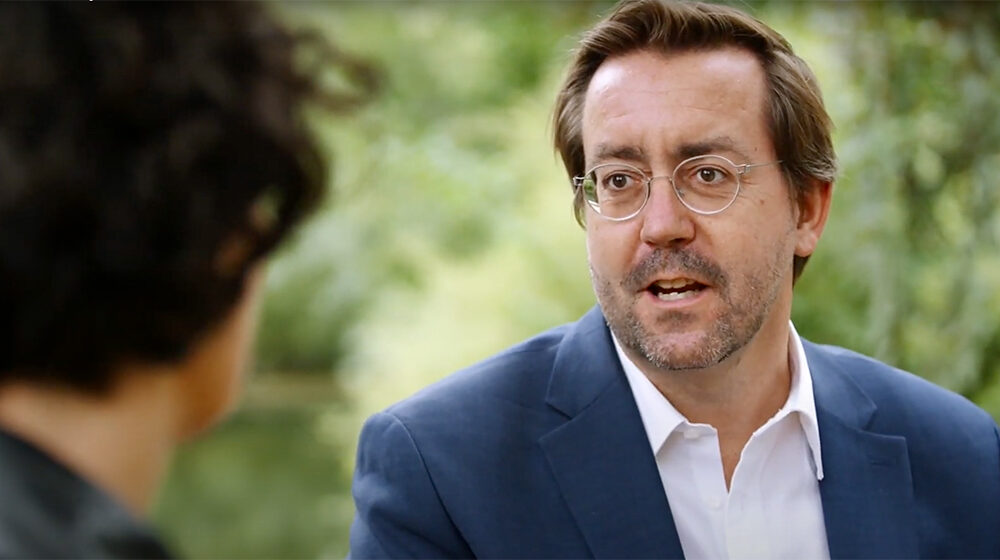Journalists at risk of persecution in Afghanistan

The Arolsen Archives stand up for diversity, respect, and democracy. In this interview, Director Floriane Azoulay talks to Christian Mihr, the Executive Director of Reporters Without Borders, about the current situation in Afghanistan and about the human rights abuses of the Taliban regime. Journalists in particular have been in mortal danger since they came to power.
As recently as mid-September, more than 100 Afghan media professionals issued an urgent appeal to the international community through Reporters Without Borders entitled “Afghan journalism is threatened with extinction.”
Floriane Azoulay: Can you tell us what things are like for journalists in Afghanistan at the moment?
Christian Mihr: Journalists in Afghanistan who want to stay in the country and carry on working as journalists never know from one day to the next whether they will be able to continue to work. They have to be prepared for the regulatory framework that governs reporting to change overnight. They know they might suddenly find themselves on a death list. They know that reports on certain subjects will not please the Taliban, and they know that if they publish such reports, they can expect family members to receive threats. Some journalists are already unable to work and have to leave the country. These people are crying out for help, I think that’s the only way to put it, because they are afraid that no help will come. And we are trying to help them as best we can.
Floriane Azoulay: Are journalists still managing to report on the current situation?
Christian Mihr: Yes, there are still some journalists in Afghanistan who continue to report on the ground. These are Afghan colleagues who stand by their opinion and refuse to give up on their country. But I have the greatest respect for what they are doing and for how they are doing it, because they face constant threats. A few foreign journalists and correspondents also continue to work there. But it’s particularly difficult outside of Kabul—in Herat, in Jalalabad, and in many other regions. The eyes of the world are not watching these places so closely, and the reports of threats we get from other regions are much worse than the reports we get from Kabul.
Floriane Azoulay: Why do journalists come under direct attack in countries where political regimes are in turmoil?
Christian Mihr: Journalists have a responsibility to report on what’s happening. At the moment, that means they’re reporting on things that aren’t working, on contradictions, on problems, and on corruption. When you do that, you automatically become a thorn in the side for people in powerful positions. That’s why journalists are persecuted: because they report on the truth and reveal why things aren’t working, and because they unmask people who are corrupt or criminal. Their work automatically ruffles people’s feathers, and that’s what exposes them to risks.

»And as I understand it, I think you have the opportunity and the responsibility to talk about the past today. I think we should see the past as a constant reminder.«
Christian Mihr, Executive Director of Reporters Without Borders
Floriane Azoulay: What can we do to support Reporters Without Borders?
Christian Mihr: I think the Arolsen Archives are a tremendously important institution. Firstly, because the Arolsen Archives are an institution that deals with the past. But what happened in the past must not and should not be allowed to happen again. And as I understand it, I think you have the opportunity and the responsibility to talk about the past today. I think we should see the past as a constant reminder. And that’s exactly what I see in the files held by the Arolsen Archives: their records include the cases of many journalists who were persecuted and murdered during the Nazi dictatorship — just for doing their job. I see the same things still happening today. I believe it’s important to draw attention to the fact that the story isn’t over. Things that happened in the past can always repeat themselves in one way or another. We had a dictatorship then, and dictatorships and unjust regimes still exist today. The story isn’t over. I think that’s something we can work on together very successfully. Let me put it another way: We can always learn lessons from the past.
This interview is the start of a new series titled “#everynamecounts | Spotlight: Afghanistan”. In the next episode, Floriane Azoulay will meet Afghan artist Sara Nabil and talk to her about persecuted artists.


